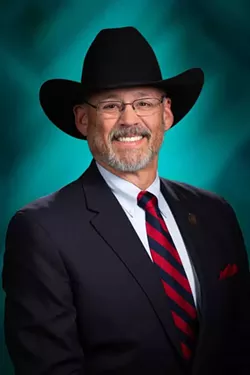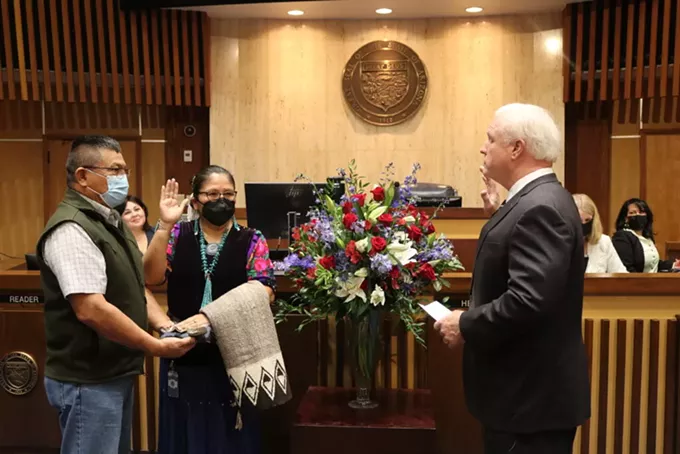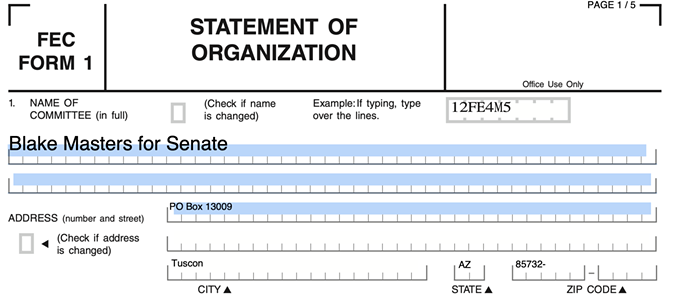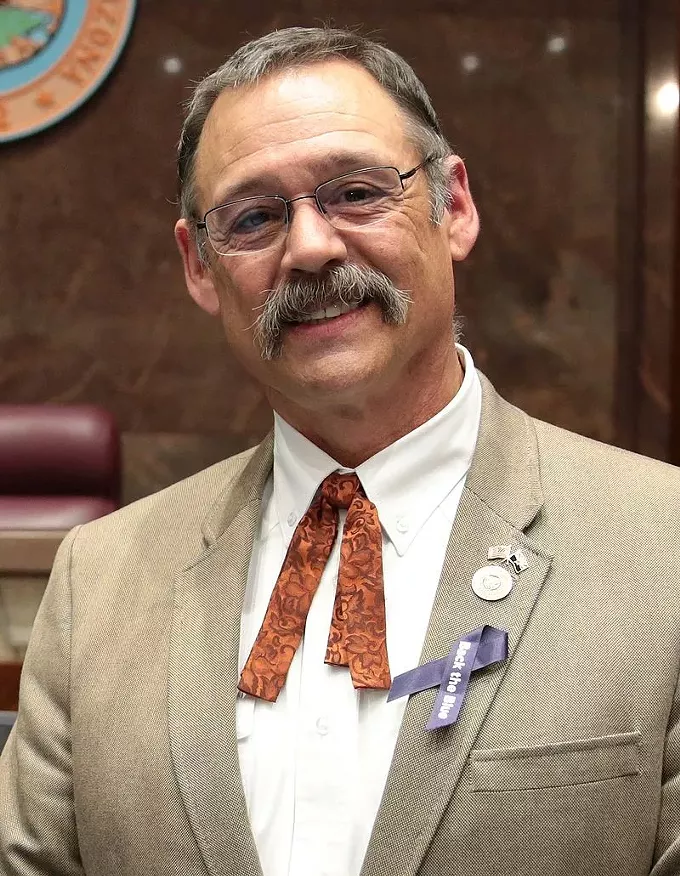Friday, February 25, 2022
Why are Republican Senate candidates having such a hard time spelling “Tucson” correctly?
First it was gunfighter cosplayer Jim Lamon, who is seeking to challenge Sen. Mark Kelly in November.
Lamon, who was one of the fake electors who were plotting to overturn the 2020 election, got some ink a few weeks back when he misspelled Tucson as “Tuscon” when announcing he was opening a new office, leading to him getting tweaked on Twitter by Arizona Daily Star columnist Tim Steller.
Spelling “Tucson” right is the first step toward winning it, @jim_lamon . pic.twitter.com/s5utcx53wG
— Tim Steller (@senyorreporter) January 30, 2022
Lamon fixed his spelling errors and then said it was important to get back to talking about "important issues." Then on Feb. 8, Lamon misspelled Tucson again in a subsequent tweet that was deleted before he could get dragged over the coals again.
After Lamon’s first misspelling, fellow Republican Senate candidate and Thiel Capital minion Blake Masters gave Lamon a lesson in how to spell Tucson.
Jim, congrats on your new office. That’s T-U-C-S-O-N by the way, 2nd largest city in the state, I recommend getting that down 🤠 https://t.co/i7pvUhvhZm
— Blake Masters (@bgmasters) January 30, 2022
So you can guess what’s next: Team Masters showed they needed a proofreader of their own. When filing a state of organization for the race with the FEC, the campaign also misspelled Tucson as “Tuscon.” It’s even more embarrassing for Masters, who grew up in the Old Pueblo.
The Masters campaign did not respond to a request for comment from Tucson Weekly. Maybe if we’d spelled it Tuscon Weekly, they would have gotten back to us?
Wednesday, February 23, 2022

A bipartisan plan from two lawmakers whose names end in -ston ... A strange strategy that isn't legally sound ... And the kind of poem you'd write in English 101.
After cities killed a bipartisan, wide-reaching plan to attack Arizona’s unaffordable housing problem, a bipartisan duo are pushing a piecemeal approach that is earning both high praise and some heavy scorn at the Capitol.
Four bills, drafted as strike-everything amendments by Sens. David Livingston, a Republican, and Lela Alston, a Democrat, moved through the Senate Appropriations Committee yesterday.
The strike-everything amendment to Senate Bill 1634 would require cities or counties with more than 100,000 people to choose at least four strategies from a list of more than 20 to incentivize affordable housing. Smaller municipalities would choose at least one strategy, which range from increasing density to expediting applications for new affordable housing to allowing more guest houses or duplexes or triplexes in single-family residential areas. It would also allow for more “novel, creative or innovative incentives for developing affordable housing.” And it would force cities to study and draft plans for addressing their affordable housing shortages.
The striker to SB1117 would incentivize building larger affordable housing complexes by eliminating state property tax for owners of low-income housing with up to 600 units. The previous cap was 200 units.
SB1531 as amended would appropriate $100 million of federal American Rescue Plan Act funds to the Housing Trust Fund, which funds affordable housing developments, housing assistance programs and homeless shelters.
And SB1581 would offer $50 million in federal ARPA funding to cities and counties to develop “sanctioned camping sights” for the homeless.
Of the four, the only measure facing organized opposition is SB1581, which requires as a condition of receiving the grants that cities adopt and enforce ordinances against “urban camping” (read: being homeless) at unsanctioned sites.
Friday, February 18, 2022
“Period Poverty is essentially the lack of access to menstrual products and sanitation facilities and it also covers a lack of education of menstruation and the menstrual cycle,” said DBSA marketing coordinator Riley Mentel.
According to the nonprofit, one in four U.S. women struggle to afford period supplies each year. In addition, one in five low-income women have reported missing work, school or other priorities due to a lack of period supplies. While known for providing diapers and incontinence supplies, DBSA also provides menstrual products, with more than 200,000 products donated every year.
“The pandemic ramped things up for us,” said DBSA CEO Dr. Shannon Roberts. “We’ve seen more requests for product and support now than prior to the pandemic. And that's primarily because people who weren’t in need are now in need.”
Arizona is one of many states that tax menstrual products as a luxury good, whereas products such as toilet paper, condoms and over-the-counter drugs are considered necessities and are not taxed. The tax, as well as the general pricing, continues to bar many in need of these products.
“People don’t ask to have a menstrual cycle, it's something that you’re born with,” Dr. Roberts said. “You shouldn’t have to suffer financially because you can’t provide for those products. It's not a luxury, it's a necessity.”
This year, sororities from the University of Arizona and five local Tucson businesses have volunteered to host period supply drives: MAST Jewelry, Sam’s Place, Casa Kira, The Bra Spa, and Eastland Alley Design Co. All throughout February sorority members and customers are encouraged to bring donations to the participating organizations, and some have even planned events that coincide with the campaign.
“It's a nice opportunity to start conversations about what this tax is and how it might impact women around Arizona,” said Kira Geddes, owner of Casa Kira.
On Feb. 12, Casa Kira encouraged period product and cash donations with a Valentine’s Day open house. Contributors were given 50% off any pair of Casa Kira earrings as well as entered into a raffle to win a basket full of local art.
“This is my second time doing it, I did it last year as well, and I just felt like it could be a really great awareness building and donation opportunity,” Geddes said.
In addition to in-person drives, the Diaper Bank of Southern Arizona and various businesses will be offering virtual drives where cash donations can be made directly to the organization.
While February is used to highlight period poverty, DBSA accepts donations year-round and the fight continues to persist.
“A lot of people come in and are embarrassed to ask for support, and we try to erase the shame and stigma for needing a resource or needing assistance,” Dr. Roberts said. “There's nothing dignified about soiling your clothes, and we want people to know it’s okay to need these resources and help them live a life of dignity.”
For more information, visit diaperbank.org
Thursday, February 17, 2022

The election fallout is election fodder … He’s an expert on ethics rules … And please buy us a water slide.
The U.S. House’s January 6th committee subpoenaed two more Arizonans this week. It wasn’t the first time the committee subpoenaed or sought depositions with Arizonans tied to the Jan. 6 insurrection and the events leading up to it, and it probably won’t be the last.
This time, the committee sought records and depositions with Arizona Republican Party chair Kelli Ward and Arizona Rep. Mark Finchem as it looks further into the fake electors who sent documents claiming Trump won the 2020 election in their states.
In a letter to Finchem, the committee cited his public comments about the election being stolen or rigged, as well as a meeting in Phoenix where Finchem met with Trump’s legal team where he made false claims about the election. The committee also noted Finchem’s presence in Washington on Jan. 6.
As for Ward, the committee called out her texts asking an election official to “stop the counting” and her actions as one of the fake electors, among other claims she made about the election.
We’ve talked a bit about the Jan. 6 committee, its Arizona ties and the fake electors plot over the past couple months — it has clear that the fake electors issue resurged recently because of the committee’s work to understand who set up the fake electors plan, any coordination between Trump and the actions some states took to try to usurp the voters.
The committee subpoenaed two others who signed on as fake electors in Arizona in late January. The fake electors plot continues to surface on news networks seemingly daily, like on MSNBC’s Rachel Maddow Show, for instance, which reported that Arizona Rep. Jake Hoffman, one of the fake electors, reached out to former Vice President Mike Pence on Jan. 5, 2021, about the slate of electors and asked him to delay the certification.
Wednesday, February 16, 2022

Political party activists, not county supervisors, would get the final say in who fills vacant seats in the legislature under a proposal advanced by the Senate Government Committee.
Currently, if members of the legislature resign, die or otherwise vacate their seats, the precinct committeemen — the elected, voting members of a political party’s organization — from the departed lawmaker’s district nominate three finalists to fill the vacancy. The board of supervisors from the former lawmaker’s county then selects the replacement from that group.
Senate Bill 1063 would change that system to remove the county supervisors from the equation. The precinct committeemen, or PCs, as they’re often referred to, would make the decision themselves.
The bill would make another significant change. Under the current system, only PCs from the county the former lawmaker lived in get a say in who the three finalists are for to fill a vacancy.
In some parts of the state, that restriction is irrelevant. Fifteen legislative districts on the current legislative map, and 17 in the map recently approved by the Arizona Independent Redistricting Commission, are wholly contained within Maricopa County.
Other districts, however, span many more. The current District 7, for example, includes portions of seven counties.
Sen. Vince Leach, the bill’s sponsor, cited the districts that traverse multiple counties as the impetus for the bill.
Last year, Rep. Bret Roberts, Leach’s seatmate in District 11, resigned and moved to South Carolina for a new job. Leach, an Oro Valley Republican, noted that the 77 elected PCs in Pinal County, where Roberts lived, selected the finalists, while the 162 elected PCs from the Pima County portion of the district sat on the sidelines.
“Think about that — shut out of the process,” Leach told the committee. “What this bill does is it says everybody gets to vote.”
It’s the 230 elected PCs in the legislative district who should have made the decision, not the Pinal County Board of Supervisors, Leach said.
Precinct committeemen are the foot soldiers of political parties. They are elected by voters during the primary elections that occur in even-numbered years. They largely handle local political matters in their legislative districts, but also play a role in county party activities and vote for the state committeemen that guide state party actions.
Sen. Warren Petersen, R-Gilbert, said the legislature should delegate more power to PCs when it can.
“They know the people in their district better than anybody — better than the board of supervisors, I must say,” he said.
PCs and county supervisors sometimes have divergent interests. The PCs represent the grassroots base of the party, and at times their first choice is overridden by the board of supervisors. The bill also comes as many Republicans are at odds with the Maricopa County Board of Supervisors over its rejection of false claims that the 2020 election was rigged, a conspiracy theory embraced by many in the GOP.
Though Leach said there should be bipartisan support for the bill, the committee’s Democrats weren’t sold. Sen. Theresa Hatathlie, of Coal Mine Mesa, who was appointed to the Senate in January, questioned whether people in one county know other counties well enough to make decisions about who should represent them. Leach countered that the same factor is in play in regular elections. It’s up to the candidates themselves to convince PCs that they’re the right person for the job, he said.
Sen. Martin Quezada, a Glendale Democrat who originally came to the legislature through appointment, said he liked that the bill includes all of a district’s PCs in the replacement process, not just the ones from the former lawmaker’s county. But he didn’t want to remove the supervisors from the process. He told Leach he was voting no, but appreciated his efforts to reform an imperfect system.
“I like to have that protective layer of the board of supervisors to ensure that the right person is selected,” he said.
Arizona Mirror is part of States Newsroom, a network of news bureaus supported by grants and a coalition of donors as a 501c(3) public charity. Arizona Mirror maintains editorial independence. Contact Editor Jim Small for questions: info@azmirror.com. Follow Arizona Mirror on Facebook and Twitter.
A Republican bill that would bar the state from making the COVID-19 vaccine a requirement for school enrollment passed out of committee Tuesday.
“Some may ask, why is this necessary now? It’s not being mandated,” Rep. Joanne Osborne, R-Goodyear, said of her bill, House Bill 2086. “I want to make sure it stays that way.”
The bill would add “an immunization for COVID-19 or any variant of COVID-19” to the list of vaccines that cannot be required for school attendance.
Currently, Arizona law prohibits schools from requiring students to be immunized against HPV.
Last year, the legislature passed legislation that banned mask and vaccine mandates by schools, but the Arizona Supreme Court struck down the provisions that were unconstitutionally put into the state budget.
Osborne, who said she is not an “anti-vaxxer,” said that she decided to bring the bill because she had heard stories on the radio about young athletes being forced to get the vaccine in order to play in high school sports.
The push to temporarily raise the state’s spending limit for K-12 schools and avoid nearly $1.2 billion in cuts that could close classrooms passed easily in the state House of Representatives but stalled out in the Senate, where it may only be one Republican shy of the 20 votes needed to pass it.
With the Senate’s 14 Democrats unanimously supporting the measure, legislative leaders need only five Republicans to get to the two-thirds supermajority required to raise the aggregate expenditure limit, which is necessary to allow schools to spend the money that lawmakers budgeted for K-12 education last year.
Five Republican senators — Nancy Barto, Paul Boyer, Tyler Pace, T.J. Shope and Senate President Karen Fann, who sponsored the resolution to raise the cap — confirmed to the Arizona Mirror that they’re supporting the measure.
That means there are 19 votes. But the pivotal 20th vote proved elusive on Tuesday. Fann delayed the start of the Senate’s floor session by more than a half hour while she tried to round up the last vote. She wouldn’t confirm how many votes she already has, but says she’s close.
The problem is that many Republican senators won’t vote for the resolution until they know that it won’t open the door for Proposition 208, a voter-approved income tax hike on wealthier Arizonans. The Arizona Supreme Court ruled last year that the tax hike is illegal if the new revenue would exceed the aggregate expenditure limit, and sent the case back to a Maricopa County Superior Court judge to determine. So far, Judge John Hannah has taken his time.
Last week, Hannah told legislative leaders that he’ll issue his ruling on his own timeline. The Arizona Constitution sets a March 1 deadline for lawmakers to raise the expenditure cap before districts will have to start making budget cuts. Superintendent of Public Instruction Kathy Hoffman says that would represent a cumulative 16% cut for school districts.
Because the school year would be roughly three-quarters over when the cuts are scheduled to go into effect, many school districts have said the impact would be massive — and could force teacher layoffs and school shut-downs.
She's even failing at resigning ... One vote down, one to go ... And it's not quite must-see TV.
In what should be the death blow to her short tenure as Maricopa County Attorney, Allister Adel’s five top chiefs penned a three-page letter recounting all her failures that somehow got worse for her with every new sentence.
Adel was already in a world of hurt over the handful of individual scandals that have rocked her office since she took over. But allegedly being drunk on the job — and drunk-dialing an employee about “pranking” another employee who had resigned — was a bridge too far for the professional lawyers at MCAO.
They sent their demand for her resignation to the county board of supervisors and the State Bar of Arizona and have launched their own ethics investigation into their boss.
The letter starts off by stating that her top deputies held an intervention of sorts with her on November 30 and warned that they didn’t have proof she was drinking on the job, but they were watching closely. The staffers walked away hopeful that she would start showing up to the office and get her act together. They said it was disappointing and shocking that she has done neither.
Tuesday, February 15, 2022
Time is a flat circle … Dodging is an art … And counting on your fingers is fine.
Republican leadership in the House and Senate finally introduced bills to temporarily lift the education spending cap, taking the first step to saving schools from running out of money — and possibly closing — two weeks from today.
But it’s far from a done deal. Word at the Capitol is that the House seems to have the votes lined up, while the vote count in the Senate is less sure.
To get that two-thirds vote, it’ll only take six Republicans in the Senate (plus one to make up for Democratic Sen. Juan Mendez, who is out on paternity leave after Senate President Karen Fann refused to let lawmakers vote remotely) and 11 in the House to avert financial disaster and keep schools from closing.
But even that will likely take some arm twisting.
The bills are “clean,” meaning they only deal with the issue of the cap. While House Speaker Rusty Bowers has pledged to keep the bill that way, Fann seemed noncommittal when Capitol scribe Howie Fischer asked. Senate holdouts are already demanding that it be tied to universal school vouchers, which is a non-starter with Democrats.
Many Republicans remain wary of lifting the cap before the dust settles on the court battles surrounding Proposition 208, which would increase taxes on high earners to pay for education. Lifting the cap ahead of that ruling could undercut their legal arguments.
Monday, February 14, 2022
Allister should focus on Allister ... George W. is focusing on Doug ... And the interns are focusing on their pronouns.
Maricopa County Attorney Allister Adel’s office continues to unravel as evidence against her sobriety and ability to do the job continues to pile up.
On the heels of last week’s media tour attempting to salvage her reputation comes a tale of two employees at the Maricopa County Attorney’s Office.
First, Communications Director Jennifer Liewer tendered her resignation Thursday with a letter imploring Adel to stop using her team to defend herself over her “sobriety and leadership.”
“As I have repeatedly conveyed, I believe the best use of the communications team is to communicate about the work of the office — not in defending the county attorney individually,” she wrote.
tweet this
More turmoil at the Maricopa County Attorney’s Office. Communication director resigns citing concerns over @AllisterAdel’s “sobriety and leadership.” Calls the situation untenable.
— Robert Anglen (@robertanglen) February 11, 2022
Read her resignation letter here. Story coming soon @azcentral pic.twitter.com/vKYsKXiFq0
Liewer was one of the few competent public-facing people in that office and Adel’s decision to toss her out of the building for speaking truth to power shows a vindictiveness unbecoming of her position, the Republic’s Laurie Roberts wrote. She called on Adel to resign. Liewer — a longtime communications professional and ally of Adel’s who was among her earliest hires and has stood by her side through a string of scandals in the past two years — offered a three-week notice. But Adel had security escort her out instead.
When you’re perp-walking your top communications person out of the office, you know you’re in trouble. 12 News and The Republic each had stories up Thursday evening within five minutes of each other saying Liewer was escorted out.











